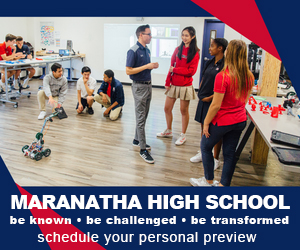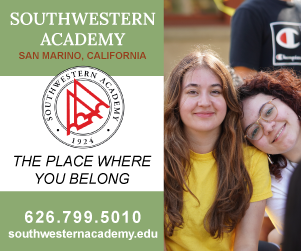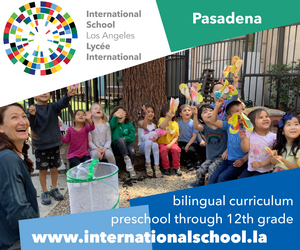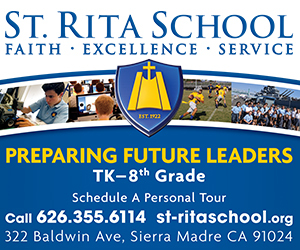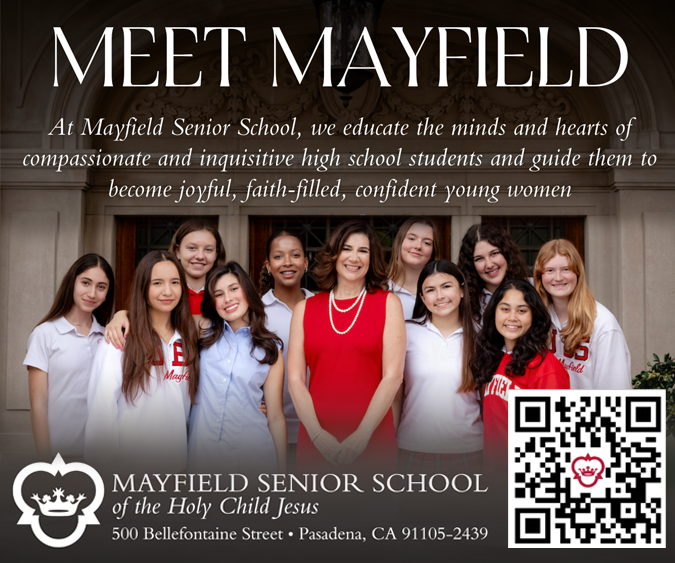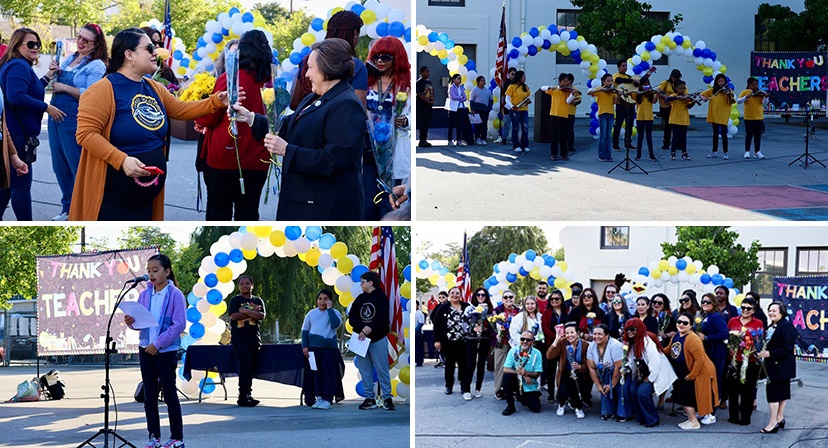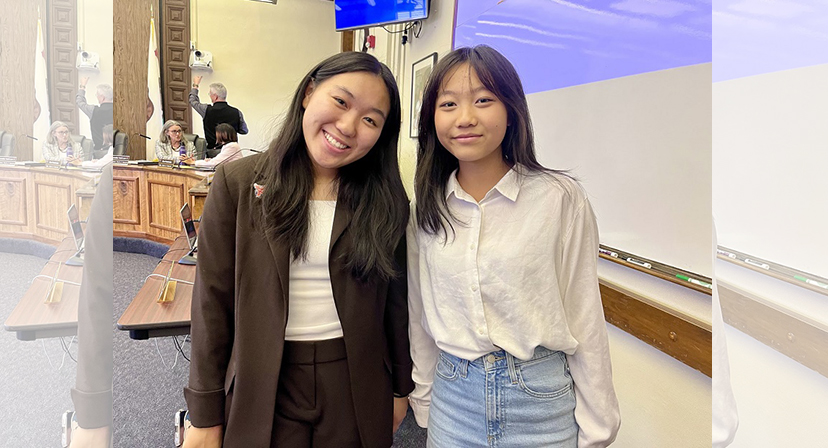What Do a Horse Named Cortado, Spam Sushi, and a Podcast Have in Common?
High Point Academy’s Middle School Students Explore the Practical and the Sublime as They Prepare for the Future.
Every day something special happens in junior high: electives and “Affinity Groups” offer up a selection of meaningful, challenging projects that supplement the 7th and 8th grade curriculum. Some are merely meant to foster interest or curiosity in something new and different, some push the boundaries of thought and critical thinking, and one is a fun new interscholastic sports team.
Mrs. Colleen Zeiss’s English students accepted the challenge of the National Public Radio podcast competition this year. Aside from learning the technical requirements for a podcast, groups developed well-defined topics for their presentations. Elliott Kalan, a professional podcaster (and husband of HPA’s librarian Danielle Kalan), coached the teams as they prepared to launch. Mrs. Zeiss was steward of the research process, including the bibliography material required by NPR. Topics this year included pros and cons of stem cell usage, Chinese censorship, pandemic restrictions and their effects on students, gay rights, and the impact of micro-plastics.
Donovan B. described his team’s podcast subject: “We are currently doing our prep for the English class podcast. Our topic is Chinese Censorship. We came together as a group because we are all Asian and had similar ideas. Our group used material from The Guardian, among other news sources. The podcast is about how China has faced censorship and how this has created an expanding impact. It shows how censorship in China has developed over time, how it is used by the Communist Party of China to bolster their image, and how it has negatively impacted people living there.”
Along the same lines, Mr. Gint Valiulis’s history classes approached their National History Day Competition with high-impact topics as well. Despite the required rigor and dedication, this elective has been a popular offering for years, and it always stays relevant. One team explored the subject of plastics for their “Turning Points in History” submission.
Gavin F., age 14, explained: “One reason I chose the History Day elective is it seemed like a good challenge and there is no history final. Other kids said it was a long process preparing for the presentation, but they took away good research skills, and not a lot of junior high schools emphasize the demanding research process we went through. As a team we chose “Plastics” for our topic. Plastics present a turning point—revolution to pollution. We actually started researching during the summer and chose which format we wanted, such as documentary, podcast, paper, website, etc. Next came a thesis.”
Anderson N., also 14, continued, “At the actual competition, we were in a room with two judges. There was dead silence as we gave our oral presentations and shared a website that we created. The questions from the judges were scary, but after we gained more confidence, it went smoothly. Preparation was the key. I felt quite anxious at first because we didn’t see other teams perform in the competition. We won first place because we were supported by Mr. Valuilis, and we finally got in the groove. The only downside was we missed some sleep while we were preparing for the whole thing.” https://site.nhd.or/36810491/home
At the other end of the campus, junior high students are exploring clubs called “Affinity Groups”—opportunities to try something new or just meet with students who share similar interests. Under the watchful eye of sixth-grade teacher Sarah Nguyen, one such group meets weekly to create delicious food and, of course, eat it. The Cooking Club has just completed putting together a simple delicacy: Spam Musubi.
Lexi N., age 12, said, “I chose the cooking club because I like to make stuff. It’s a fun change and an opportunity to be creative also. I especially liked when we did the cupcake contest and the staff judged it.”
Less tasty, but just as rewarding, students can meet to explore cultural or political issues in a safe, respectful setting and to gain valuable skills. The Investment Club is a case in point. No sweet treats there, but great insight into the workings of the stock market. Math teacher Teo Cutter advises the club: “The idea behind the affinity groups is like-minded individuals getting together.”
Tyler W. explained that he “had very little knowledge going into stocks, so everything was kind of a new experience”.
Max L. chimed in: “You can do over $100,000 by using margin buying (like credit). It’s called ‘buying power.’ My parents always said it’s hard to become wealthy on a 9-5 job, so I’m trying to look for other sources. I’ve had a curiosity about investing, and it’s also something I’m looking forward to pursuing. What we’re doing in the club is called the Stock Market Game™, and it’s meant to mimic the stock market and build our own portfolios. It can be a competition or just an exercise. It’s based on real stocks that we have to track, but no real money is used.”
“Our investments were only stocks and bonds. No commodities. We started with $100,000 for our portfolios. The stock market requires monitoring and follow-through. We are running out of water, so I’m looking at water companies as investments. My total investment is in the red today, but in the grand scheme of things, I’m up,” added Isael S-A.
Back in Mr. Valiulis’s history class, students who like to argue have found the perfect elective—Debate Team. Aden Z. acknowledged, “I like to argue, and also, I wanted something that was different from sports for an after-school activity. It has lived up to my expectations since I was interested in The Great Debates series. In terms of debate, I think how you feel depends on how much you know. Preparation is important for being successful. We learn to focus on proposal and opposition. Originally, I thought about being a doctor when I get older, but I’ve been told by judges that I should be a lawyer.”
William G. added, “I decided to do debate because I want to try something new. I started in 7th grade, and I was very surprised—pleasantly so— at the first tournament. Personally, how I feel is determined by the topic. Everybody researches, but some topics are easier than others. The current debate includes the topic of ‘Open Borders’. We debate both sides. You have to be nimble—think on your feet. That’s one of the most important skills, and it applies in so many areas. I’m interested in possibly pursuing engineering, and clear communication would be important.”
Debate Coach Bella Rico says, “I’ve been an assistant coach before, but this is the first year that I have created lesson plans for the class. I see, looking back, that I applied my debate skills to everyday life. The kids don’t realize what they’re gaining yet. They are unknowingly building skills, one of which is an important ability to recognize reliable sources. I’m gratified that these kids, at 12 to 14 years of age, are able to grasp such complex issues.”
Amelia K., 14, seconded that notion. “A month before the debate competition we were assigned two topics. We prepped for both topics and both sides of the argument. It teaches you to see multiple perspectives. Research is also a big part. I chose debate because my dad is a lawyer so it might be a career booster for me if I follow in his footsteps.”
Lucas C., 13, summed up the argument. “I’ve been debating since the beginning of 7th grade. ‘Open Borders’ was one topic we focused on this time. Another topic was ‘Facial Recognition’. At first, prepping is a little hectic. It’s all very fun and joyful but difficult. I think I did my part and contributed to the team. I’m sure the process teaches speaking skills that will help in any occupation in the future.”
And finally, here’s where a horse named Cortado comes in! A delightful addition to the afterschool sports program is High Point’s own Equestrian Team, complete with Eagle-emblazoned saddle pads. It all started when several junior high girls, who ride together anyway, thought, “Let’s be a team!” The IEL (Interscholastic Equestrian League) holds competitions in the area. Riders need their own horses and trainers, and importantly, moms are also needed to help organize the effort. This year the school’s rep is Mom Vidhi Sanders. The riders on the team are Penelope S., Megan M., Cassidy I., and August L. The four-legged members are Cortado, Astronaut in the Ocean, Sonny Boy, and Que Sera Van De Koeboshoeve.
Cassidy explained how the team originally got started. “So August and Penelope and I—we used to ride together—and when we heard that there would be a regional competition, we knew we wanted to participate.”
Penelope filled in the details: “The team does show jumping for the competitions. You always need to establish a bond before riding or jumping. Since horses are animals, you have to treat them graciously because, apart from being a sport, your relationship with the horse is a crucial aspect.”
Megan joined this year to round out the team. She says, “It’s like a really fun experience to be able to travel with your horse and friends. My barn transports the horses. We did okay, but I fell off during a recent competition. Since then, I’ve learned to be a little more assertive.”
All the girls agree that “horses can be unpredictable, you have to adjust your expectations, and the horses also have good and bad days just like people.” The league is open to all riders, grades 6 and up. Pretty much all you need is a horse. For more information: https://iel.wildapricot.org/.










